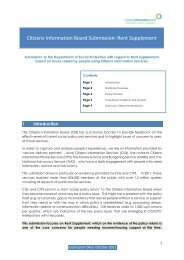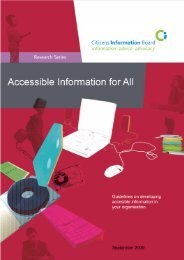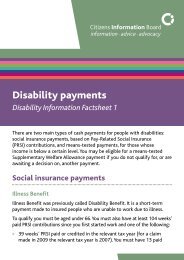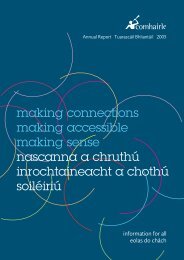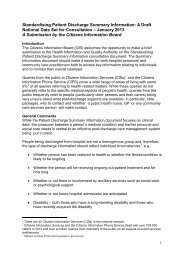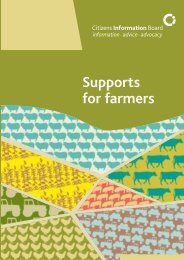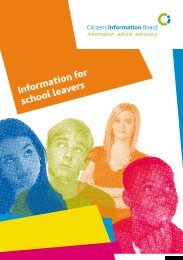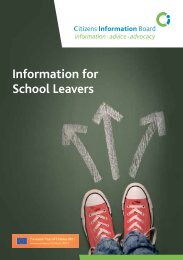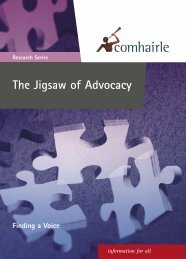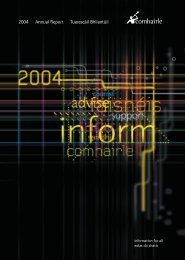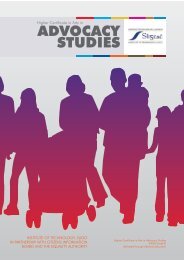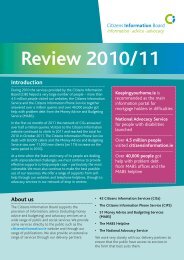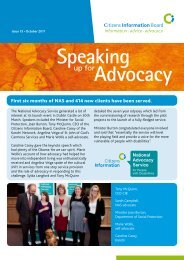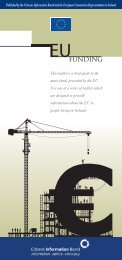Review of Sign Language Interpretation Services and Service ...
Review of Sign Language Interpretation Services and Service ...
Review of Sign Language Interpretation Services and Service ...
- No tags were found...
Create successful ePaper yourself
Turn your PDF publications into a flip-book with our unique Google optimized e-Paper software.
interpreting. These st<strong>and</strong>ards have to be defined <strong>and</strong> agreed in order for one toknow that the training programme <strong>and</strong> individual interpreter meet that st<strong>and</strong>ard.In the UK, the government, through the National Centre for <strong>Language</strong>s, has setNational Occupational St<strong>and</strong>ards for Interpreting <strong>and</strong> Translating, which describethe competencies required <strong>of</strong> an interpreter. These st<strong>and</strong>ards can be used for allspoken <strong>and</strong> sign languages, <strong>and</strong> they also have a currency for use across Europe.The st<strong>and</strong>ards can be used for mapping training programmes <strong>and</strong> for definingentry criteria for registers. In Australia, there are National Competency St<strong>and</strong>ards<strong>and</strong> Qualifications for Translating <strong>and</strong> Interpreting <strong>and</strong> a project is due to begin todefine st<strong>and</strong>ards. Whilst it is probable that New Zeal<strong>and</strong> will follow these, thereis no evidence to date <strong>of</strong> this.Completion <strong>of</strong> a recognised programme <strong>of</strong> interpreter training is a pre-requisite forregistration in countries such as New Zeal<strong>and</strong>, Scotl<strong>and</strong> <strong>and</strong> Engl<strong>and</strong>. Wherethere is more than one possible training course which leads to registration, <strong>and</strong>where there is a choice <strong>of</strong> vocational <strong>and</strong> university routes, it becomes morepressing to have a mechanism for mapping the st<strong>and</strong>ards <strong>of</strong> each course againstexternally agreed st<strong>and</strong>ards.5.5.3 Interpreter registrationRegistration systems are used to regulate sign language interpreters in a number<strong>of</strong> countries. Being entitled to join a register is a significant achievement in thecareer <strong>of</strong> an interpreter. Being registered gives an indication <strong>of</strong> an interpreter'scommitment to the pr<strong>of</strong>ession <strong>and</strong> to maintaining <strong>and</strong> improving his/herperformance <strong>and</strong> knowledge. It shows that the interpreter has agreed to abideby a code <strong>of</strong> ethics or practice <strong>and</strong> to comply with a disciplinary procedure.Registration gives users an assurance <strong>of</strong> quality <strong>of</strong> the interpreter <strong>and</strong> a means<strong>of</strong> seeking redress in the event <strong>of</strong> a complaint. The registration systems in thecountries studied have codes <strong>of</strong> practice (or equivalent), complaints <strong>and</strong>disciplinary procedures <strong>and</strong> appeals procedures.Most registration bodies are made up <strong>of</strong> stakeholder representatives. Somecountries have tried to include Deaf people <strong>and</strong> other stakeholders in theregistration process. In Finl<strong>and</strong>, for example, a Finnish <strong>Sign</strong> <strong>Language</strong> Board hasbeen established, which oversees the Register <strong>and</strong> Directory <strong>of</strong> Interpreters. It iscomprised <strong>of</strong> the Finnish Deaf Association, the Finnish Federation for the Hard <strong>of</strong>Hearing, <strong>and</strong> the Finnish Association <strong>of</strong> <strong>Sign</strong> <strong>Language</strong> Interpreters. In Engl<strong>and</strong>the Independent Registration Panel (IRP) registers interpreters for the Councilfor the Advancement <strong>of</strong> Communication with Deaf People (CACDP). The IRP ismade up <strong>of</strong> representatives from the Deaf community, the pr<strong>of</strong>essionalassociation, employers (including agencies), training <strong>and</strong> assessment providers.Thus there are people other than the interpreters themselves who are involved inthe regulation <strong>of</strong> interpreting practice.In New Zeal<strong>and</strong>, SLIANZ publishes <strong>and</strong> maintains a national register <strong>of</strong> qualifiedmembers. The register contains contact information for interpreters as well as theirdeclared specialities. Registered members <strong>of</strong> SLIANZ not only hold a recognisedpr<strong>of</strong>essional qualification but also commit to abide by the pr<strong>of</strong>ession's code <strong>of</strong>ethics. Entry to the register is on completion <strong>of</strong> the University <strong>of</strong> Auckl<strong>and</strong>training, but Australian <strong>and</strong> British qualifications are also recognised.<strong>Review</strong> <strong>of</strong> <strong>Sign</strong> <strong>Language</strong> <strong>Interpretation</strong> <strong><strong>Service</strong>s</strong> <strong>and</strong> <strong>Service</strong> Requirements in Irel<strong>and</strong> • page 103



